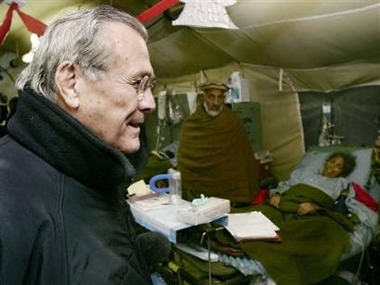|
Rumsfeld warns against early withdrawal
(AP)
Updated: 2005-12-22 14:14
In a holiday season pep talk to U.S. troops, US Defense Secretary Donald
Rumsfeld said an early withdrawal from Afghanistan or Iraq would lead to new
terrorist attacks on Americans at home.
Rumsfeld spoke to several hundred soldiers in a heated tent at this base that
serves as the main airfield for U.S. forces in Afghanistan.
"If we were to withdraw from Afghanistan precipitously, or from Iraq, the
terrorists would attack us first somewhere else and then they would attack us at
home, let there be no doubt," he said.
Rumsfeld thanked the soldiers for their service.
"The momentous changes here could not have happened without your service," he
said.
Earlier in Kabul, Afghanistan's capital, Rumsfeld said reducing the number of
U.S. troops in Afghanistan will not weaken the campaign against Taliban fighters
and al-Qaida terrorists who still threaten this war-torn country.
"Our level of activity is substantial and continuous," Rumsfeld told a news
conference outside the heavily guarded Presidential Palace after meeting with
President Hamid Karzai.

U.S. Secretary of Defense Donald H. Rumsfeld
tours a Mobile Army Surgical Hospital (MASH) in Muzaffarabad, Pakistan, on
Wednesday Dec. 21, 2005. [AP] | "We certainly remain committed to our long-term relationship, the strategic
partnership between our two countries," Rumsfeld said.
A day earlier, he announced that the size of the U.S. force in Afghanistan
will shrink from about 19,000 currently to about 16,000 by next summer.
"We will continue to be focused on rooting out the Taliban and al-Qaida that
still exist in causing difficulties for your country," Rumsfeld told Karzai, who
stood beside him at the news conference.
Karzai, noting that Vice President Dick Cheney had visited Kabul on Monday,
told reporters the U.S. government has assured the Afghans that a reduction in
U.S. forces will not undermine joint efforts to improve internal security.
"The United States has assured us of continued support and assistance on all
matters," including security, Karzai said, adding that his own forces are
becoming more capable of handling problems on their own.
There are now about 26,800 soldiers in the Afghan national army and about
55,000 national police. Rumsfeld said the remaining U.S. troops would continue
to help train and equip the Afghan security forces and will work with NATO on a
variety of security projects.
Rumsfeld told Karzai it was his 10th visit to Afghanistan since the U.S.-led
invasion in October 2001 that ousted the Taliban. More than four years later,
U.S. forces still have not captured al-Qaida leader Osama bin Laden, who used
Afghanistan as a base before the U.S. invasion.
The defense secretary told reporters traveling with him that bin Laden, if
still alive, is most likely hiding in the Afghan-Pakistan border area. He said
he finds it hard to believe that bin Laden is able to fully command the al-Qaida
organization, since he presumably is spending a great deal of time and effort
avoiding capture.
On a day that began before dawn in Washington, Rumsfeld crossed 11 time zones
on three airplane fights and six helicopter rides that included stops in
Pakistan before finishing at Bagram air base, north of Kabul.
In Pakistan, Rumsfeld toured U.S. military units that are part of an
international humanitarian relief operation for victims of the Oct. 8
earthquake, which killed more than 80,000 people and forced more than 3 million
from their homes as it devastated parts of northwestern Pakistan and the
disputed Kashmir region.
At Muzaffarabad, a town near the quake's epicenter, Rumsfeld visited the
212th Mobile Army Surgical Hospital. The unit's commander, Col. Angel Lugo, told
him that more than 200 patients a day are being treated at the facility, which
includes an intensive care unit.
Lugo said only about one-third of the patients are suffering directly from
quake-related injuries. Many are ill and cannot find help elsewhere because the
quake destroyed a large number of local medical facilities. They range from
infants to the elderly, he said.
Rumsfeld also flew by helicopter to Shinkiari, where a Marine Corps medical
unit is providing care for about 200 people a day, and to Qasim army airfield,
where U.S. soldiers are maintaining the helicopters and other aircraft used in
the relief mission.
|